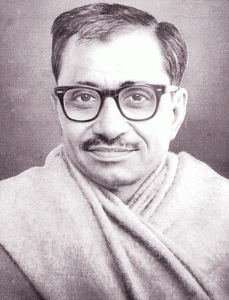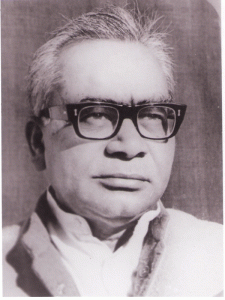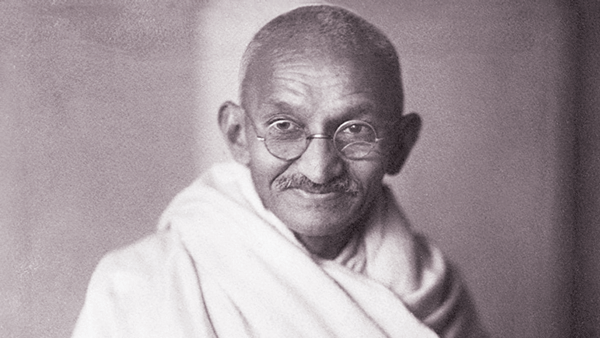VASANT NARGOLKAR
Deendayal, like Gandhi, was very simple in his habits and believed in the dignity of labour. He cared very little as to how he looked or how he dressed. Once, seeing that the nearby saloons were crowded, he got his hair cut by a roadside barber. Asked by jeering friends as to why his hair was so uneven, he simply replied: “I was shon of time and this poor barber on the roadside scented to be short of customers!”
In 1961, Deendayal was once to visit a college in U.P. for giving a talk to the students. Seeing that his clothes were soiled and tattered, his friends offered him a new Kurta and dhoti as well as a new pair of shoes. On his return from the talk he put on his old clothes again. His hosts asked hint the reason why. He innocently put a counter-question: “Do you mean to say that you had donated to me the clothes and the shoes? I thought you had just loaned them to nest”
On one occasion Deendayal was to meet local workers in Agra at the Jan Sangh office. As it was a hot day, it was decided to hold the meeting in the evening on the terrace of the; building. When Deendayal reached the terrace, he found that it was covered with accumulated dust. He thereupon, called for a broom and himself swept the floor before others arrived there with a carpet and a pallet for him I
Deendayal’s Concern for the Poor

On another occasion, Deendayal was travelling first class in a train with a fellow passenger who happened to be a government officer. A shoeblack entered the compar¬tment and requested the officer to allow him to polish his shoes. The officer enquired of the boy whether he had a piece of cloth to give a finishing touch to the shine. The boy said he had not. The officer then refused to get his shoes polished. The boy was probably hungry and seemed disappointed. Deendayal noticed his condition and hence took out an old towel from his cloth bag, tore off a small piece and gave it to the boy. The officer then agreed to get his shoes polished. The shoeblack felt happy. At the next station, looking at the large gathering which shouted slogans and welcomed Deendayal, the officer realized that his fellow passenger, though dressed shoddily, was no other than the well known national leader of the Jan Sang, Deendayal’s concern for the poor and the suppress¬ed showed itself thus even in small acts of kindness.
Thus simplicity, carelessness about personal appear¬ance, readiness to undertake any work considered if for inferiors or the so-called low castes, kindheartedness, active concern for the poor and love of their motherland as well as of the humanity at large, were a few among the many attributes which were common to Mahatma Gandhi, Dr. Lohia and Pandit Deendayal.
Selfless Service, Their Common Mission
These three were indeed great as men, but the missions that they undertook in their life-time, made them even greater. Utterly selfless service of the nation was in general the common life mission of Gandhi, Lohia and Deendayal, though their ideologies differed considerably. The ideology of Sarvodaya evolved out of the words and deeds of Gandhi. Lohia was a Socialist who whole-heartedly accept¬ed some principles and programmes of Gandhian Sarv¬odaya. Deendayal was originally an ardent advocate of the theory of “the Hindu nation,” but later he himself propounded a new ideology and named it “Integral Humanism”.
The number of causes that Gandhi espoused during about half a century of his public life is legion. In South Africa, he fought against the vicious colour bar. On arrival in India, achievement of Indian independence soon became the most principal objective of his life. Apart from these, he advocated the vow of Swadeshi, the revival of Khadi and Village Industries. prohibition, removal of untouchability, educational reform through Nai Taleem, communal harmony, the adoption of Hindustani as the national language and nature cure. Without making it into a movement for the “liberation” of women, he involved women in programmes of picketing liquor shops and satyagraha Gandhi was an indefatiguable worker himself and hence he could easily inspire or inject a sense of mission and urgency among his associates, followers and countrymen.
Purity of motive, strength of character, selfless devo¬tion, humility, wordly wisdom and the power of the spirit constituted the fibre of his greatness and gave him an un¬paralleled sway over the educated as well as the half-educated and illiterate masses of people.
Lohia was also an indefatiguable leader. His main mission in life was the propagation of the ideology of demo¬cratic socialism and if possible, capture of state power through the parliamentary programme supported whenever necessary by non-violent direct action against any and eve, social, economic and political injustice. He was in fact one of the founders of the Congress Socialist Party which came into existence in 1934 within the Congress. Between 1936 and 1938, Lohia was the secretary of the Congress Foreign Department which worked under Shri Jawaharlal Nehru’s chairmanship. Lohia’s vast knowledge of international affairs and his deep interest in the economic development of Western and Asian countries which he exhibited later, was based on the work that he did during these two years. In 1942, along with some other Socialist leaders he went underground and tried A organize an armed resistance movement throughout the country. Like Gandhi, independence of Ads was Lohia’s main pre-occupation until 1947.
After the death of Gandhi, the Socialists severed their connection with the Congress. Lohia was thereafter not only always opposed to collaboration with the Congress, he equally disapproved of the policy of hobnobbing with the Communists. This was his ‘Theory of equidistance’, which he later named as ‘the theory of equal irrelevance’!
Lohia wanted his party workers to engage themselves in mass agitations and mass struggles. He was a champion of the small kisans and landless labourers. He was afraid that Jayaprakashji’s cordial relations with Shri Nehru might lead to a policy of abandonment of the path of struggle by his party. He used to criticize Vinobaji’s Bhoodan move¬ment as of no consequence, for Vinobaji had rejected Gandhi’s satyagraha as a non-violent weapon for securing justice to the oppressed and the poor.
Lohia’s Faith in Non-Violence

Lohia had over the years corne to believe in the value of non-violence, so much so that he did not approve of a firing resorted to by the Kerala Government in 1954. The Chief Minister there happened to be a leader of the Kerala Praja Socialist Party. A crisis developed over the issue resulting in the expulsion of Lohia from the party. He soon formed a separate party and named it ‘The Socialist Party’. All this shows how Lohia had moved nearer to Gandhi to far as satyagraha and non-violence were concerned.
Lohia’s attitude to the Hindu- Muslim problem was also similar to Gandhi’s. Though he, like Gandhi, was opposed to the creation of Pakistan, he believed in Hindu-Muslim unity. During 1946-47, at the behest of Gandhi, he had risked his life a. visited his Muslim friends in the riot-torn city of Calcutta. On another occasion, he saved a Muslim boy who had accompanied him, from the fury of a Hindu mob in Delhi.
Lohia was incessantly engaged in fighting for justice and freedom. That was the permanent and real mission of his life. He had initiated or supported struggles for civil liberties in Goa and Nepal. In 1964, while he was on a visit to the U.S.A., he had participated in a Negro dernons¬tration against the colour As there and courted arrest. He demanded preferential opportunity for backward sections of the Indian society instead of mere equal opportunity. He was a great champion of women and the principle of equa¬lity of sexes. Lohia emphasized the need for constructive work also. “The Prison, the Spade a. the Ballot Box”— was his three item formula for those who wanted to work for a democratic, egalitarian social order. Lohia was a stormy petrel not only in the Lok Sabha where he fulmi¬nated on the floor of the House against the policies of Prime Minister Nehru, but also in the larger and more extenFive field of national his for over thirty years.
(To be continued)…
(Source: Gandhi, Lohia and Deendayal, Edited by- P. Parameswaran, Pub. by Deendayal Research Institute, New Delhi)


